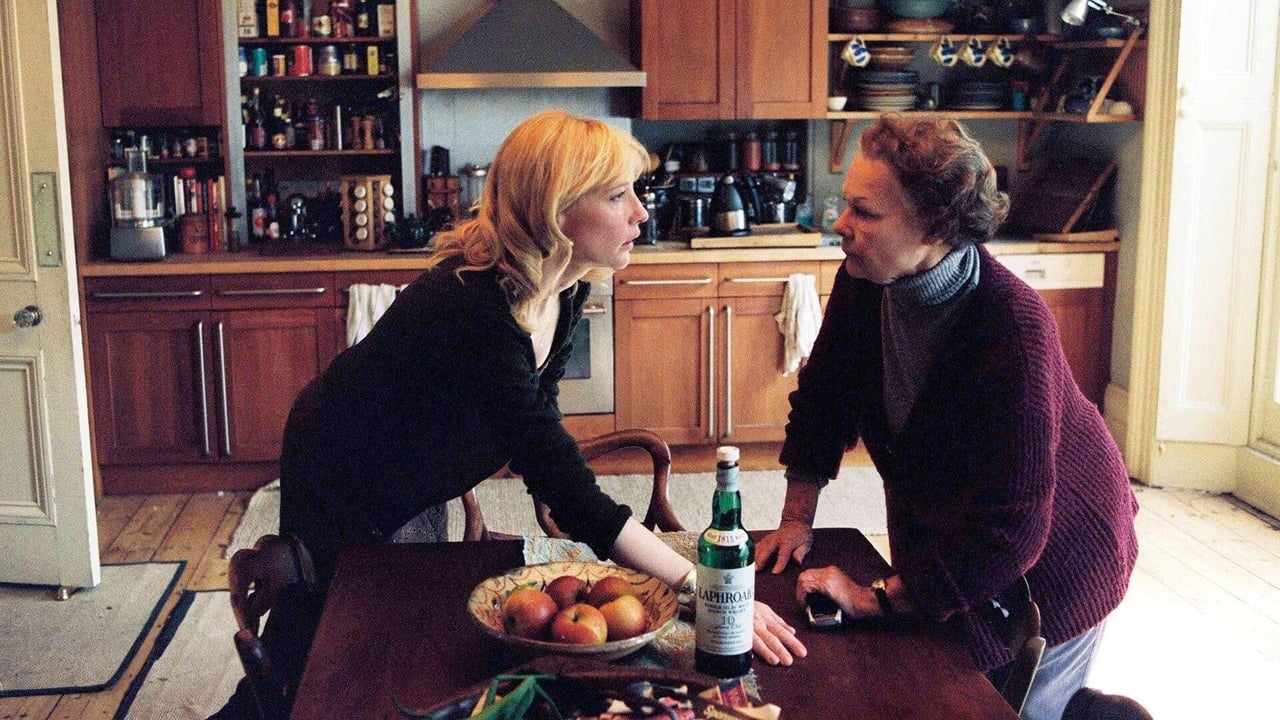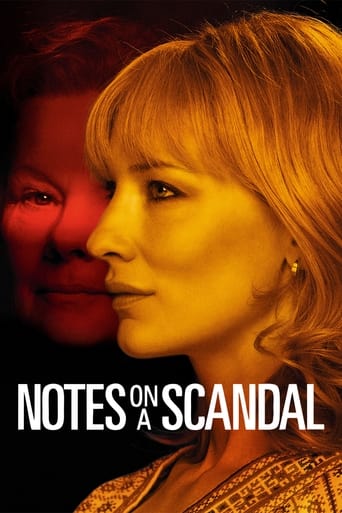Matcollis
This Movie Can Only Be Described With One Word.
Sameer Callahan
It really made me laugh, but for some moments I was tearing up because I could relate so much.
Hayleigh Joseph
This is ultimately a movie about the very bad things that can happen when we don't address our unease, when we just try to brush it off, whether that's to fit in or to preserve our self-image.
kimcristina
Barbara played splendidly,as a young initiator , lovely.
James
The world of the staff room and classroom offers great potential for drama, given the way that schools bring the young and the old(er) into close, daily contact in the context of what is - at face value at least - the noble and worthwhile mission of education. Of course, as Dame Judi Dench's jaded teacher character (the aptly-named) Barbara Covett makes clear from almost the very start of the film, the mission gains further edge when it unites in one place the working class kid with the resolutely middle-class teacher, and yet more so when the educational gap is viewed cynically (if sadly perhaps correctly) as unbridgeable. Covett leaves us in no doubt that she is an observer, but also a manipulator, par excellence, and her life of rather unfulfilled professional and emotional ambition has evolved to the point where meticulously-documented long-game attempts to position people (especially women) where she wants them has become her raison d'etre. Into this world, this established institutional scenario, comes that most archetypal of literary heroes, the new teacher - in the (not-unappealing) shape of (the again pithily-named) Sheba Hart, known to we the filmgoers as Cate Blanchett. She is to be the initially-cool and then wildly-buzzing fly increasingly enmeshed in the web patiently and steadily spun by spider Barbara Covett. And this is the fun part for those watching, since Sheba's "whiter-than-white" -ness (in every sense of the term) rapidly gives way to a kind of chaos, as her joy at finding a pupil interested in what she has to teach (coolly but powerfully played by Andrew Simpson) gives way to justifiable-if-risky favouritism and affection, and then perhaps-unavoidable, but clearly-unethical lust. There are a few erotic fireworks at this point that can claim to tip the viewer off moral balance in a small way, just as they have achieved the same effect on the grand scale between the characters involved. And just as Dame Judi's icy control makes for a spellbinding performance, so does Blanchett's "disintegration" and descent into a chaos that impinges on the lives of a number of others, not least a by-no-means innocent but kindly-enough husband (well-enough done by Bill Nighy). Such a story perhaps befits a more tempestuous Latin kind of a setting, but the makers are too clever by half to give us that clichéd way out. No, this is humdrum, lower middle-class, superficially well-organised and sedate London, in which the most spectacular setting we can come up with is a rather damp and cloudy hillside park. And of course this only adds to the contrast between the apparently "everyday" circumstances, and the truly extraordinary, yet very persuasive train-wreck of a story that unfolds and engulfs the two (three?) main characters, and all around them. It's a quite upsetting watch, in some ways, but one is ever-aware that real-life issues are being raised here, about what can and must happen - at least from time to time, when two different worlds collide...
craig-hopton
Why is a relationship between an a teacher and a young boy an interesting topic to make a movie out of? Simple - it's not. A mid-life crisis infatuation isn't something I would normally want to take two hours out of my life to watch on the telly.And indeed I was close to giving up on Notes on a Scandal. Cate Blanchett puts in a good turn as the confused attractive teacher Sheba Hart but it's just not that interesting a character. Bill Nighy is poor as the husband and Andrew Simpson is disappointingly dull as the young boy.Thank goodness then for Judi Dench. She absolutely steals the show with her portrayal of the jealous, grumpy older teacher Barbara Covett who becomes the confidante of Hart and indeed turns out to be even more infatuated with her than the schoolboy was. It's a nuanced but powerful performance - classic Dench - and transforms a terrible movie into a half- decent one. It becomes a psychological study into attraction and a fairly compelling one at that.All in all a good movie but not a personal favourite of mine.
l_rawjalaurence
We have become so accustomed to seeing Judi Dench in likable parts (PHILOMENA, MRS. BROWN), it's nice to see her playing a thoroughly unsavory person in her best role as a villain since MACBETH on television in the mid-Seventies. She plays an experienced teacher at an Islington school who befriends married art teacher Sheba (Cate Blanchett) and ostensibly tries to help Sheba through difficult times, as the younger woman embarks on an affair with student Steven (Tom Georgeson). However it transpires that Barbara's motives are very different, as she turns out to be an obsessive, concerned solely with herself and blaming others if they should reject her. Her narcissism is revealed in two ways - through her incessant writing down of her thoughts in diaries, and in her attempts to woo the viewers' favor through voice-over narration. Neither strategy actually succeeds, but Barbara still manages to emerge from her friendship with Sheba unscathed, which is more than can be said for Sheba herself, who has to try and pick up the pieces of her marriage to Richard (Bill Nighy) and re-establish her relationship with daughter Polly (Juno Temple). Shot in drab colors by director Richard Eyre, NOTES ON A SCANDAL shows how a fundamentally lonely person tries her best to compensate for a drab lifestyle, yet only succeeds in destroying others. We would like to feel sympathetic towards her - it is Dench, after all - but she is so vindictive in her attitudes that she disqualifies herself immediately. Dench is particularly good at registering anger through a single expression - a pursing of the lips, a flash of the eyes. Patrick Marber's screenplay gets a little intense sometimes, with over-intrusive music by Philip Glass, but the film remains riveting viewing throughout its comparatively short running-time.

